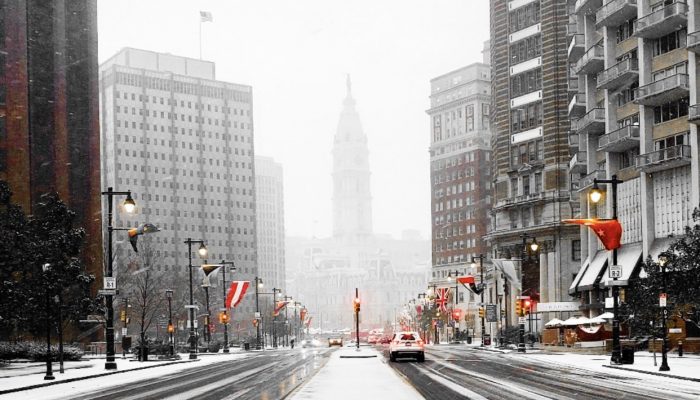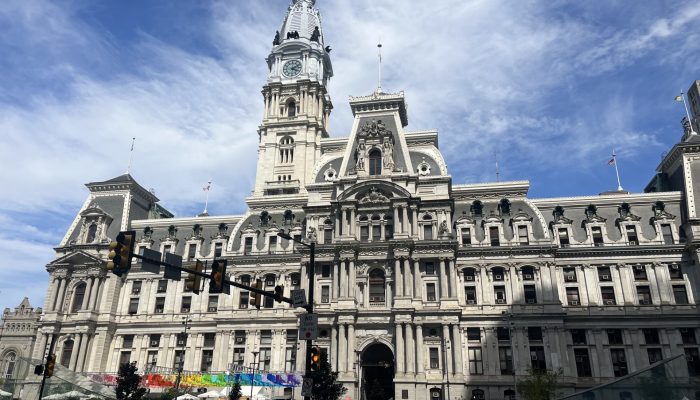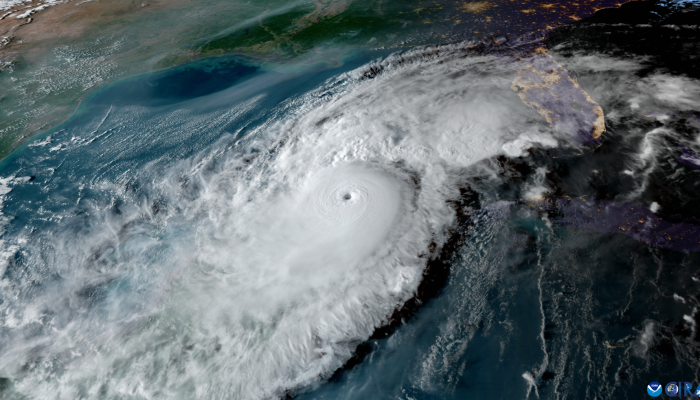The winter season isn’t officially here until December 21st, but the few snowflakes and colder temps that we’ve already experienced has us feeling frosty.
On December 5th, we held our annual OEM Winter Weather Workshop with city departments and partners.
Led by our Infrastructure Planning Coordinator, Zorina Morton, we discussed our Winter Weather Plan and got updates from city agencies like the Philadelphia Department of Streets and a seasonal outlook from the National Weather Service Mount Holly.
The National Weather Service explained we’re in an El Nino weather pattern in the United States, which means we may see more precipitation. Whether it falls as rain or snow depends on how temperatures are. Philadelphia averages 23.1″ of snow yearly, although we’ve been below that mark the past few years.
That’s some insight how we prepare for winter. Here’s a few things you can do to be ready!
Information
Stay connected to the weather forecast and important information from the City of Philadelphia. Our office will send weather alerts, like snowstorm, snow emergency, or snow squall warnings, direct to your phone or email. Text READYPHILA to 888777 to receive alerts to your device or customize your alerts by visiting our ReadyPhiladelphia webpage for phone and texts alerts.
Health
Prolonged exposure to the cold can result in serious health problems, most common being hypothermia and frostbite according to the Philadelphia Department of Health. Dress warm and stay dry.
- Dress in layers. Wear hats, scarves, and water-repellent coats. Wear mittens instead of gloves; they’ll keep your hands warmer.
- Cover your mouth. Protect your lungs from extremely cold air by covering your mouth.
- Be aware of wind chill. Wind carries heat away from the body.
- Be aware of frostbite. Frostbite is frozen body tissue, usually skin. It affects fingers, toes, ears, and the tip of the nose first. The skin might lose feeling or look white, pale, hard or waxy. Then the skin may turn red, blue or purple. Skin can also swell or blister. The victim may also feel tingling, burning or severe pain as the frostbitten tissue thaws. If symptoms are detected, get medical help immediately.
- Keep children warm, especially babies. Children and babies lose body heat faster than adults, so they can get frostbite faster.
Hypothermia (abnormally low body temperature) is a life-threatening condition. If you suspect hypothermia symptoms:
- Get to a warm location.
- Remove wet clothing.
- Put on dry clothes and wrap your entire body in a blanket.
- Warm the center of the body first.
- Drink warm non-alcoholic and non-caffeinated beverages.
- Seek medical attention as soon as possible.
Snow Removal
If accumulating snow is in the forecast, the city’s Managing Director may declare a Snow Emergency. This means that vehicles may not park on certain roads in the city so that the Department of Streets can conduct plow operations.
There are 110 miles of snow emergency routes in the city. In order to provide effective service during winter storms, streets are divided into primary, secondary, and tertiary route systems.
The primary route system encompasses 665 miles, including the 110 miles of Snow Emergency Routes. The secondary route system includes another 700 miles of streets (both systems exclude the roadway maintained by the Parks and Recreation). The balance of City streets falls into the tertiary street system, covering approximately 1,125 miles of streets, 25 miles of which are private streets.
Power Outages
A heavy snowfall, freezing rain, or high winds may cause power outages when tree limbs fall on lines or powerlines become weighed down. Have a shelter-in-place kit that includes three days of water and non-perishable food as well as battery operated flashlights.
Philadelphia’s power utility company PECO has ways to help before, during, and after a storm, including, preventing outages, storm readiness, storm restoration process, reporting outages online, and tracking current outages. Click on the “Outages” drop down menu on their homepage.
If a tree falls during a storm and poses an immediate safety threat, call 911. Otherwise, call the city’s non-emergency number 311. A crew of arborists from Philadelphia Parks & Recreation are on-call to respond to tree emergencies. In the event that a tree has fallen on electrical wires, please call PECO’s emergency line: 1-800-841-4141.
Freezing Pipes
Extreme cold can cause pipes and the ground to expand and contract, and very cold river water can also make water mains more brittle. In part, those factors can help to explain why more than half of Philadelphia’s water main breaks occur during the coldest months in a typical year.
Information from the Philadelphia Water Department looks to prevent costly repairs and provide information on what you should do if you experience pipes breaking.
If you believe you have no water because of a water main break, call (215) 685-6300 and select the emergency option. Water Department emergency crews will investigate the report.




